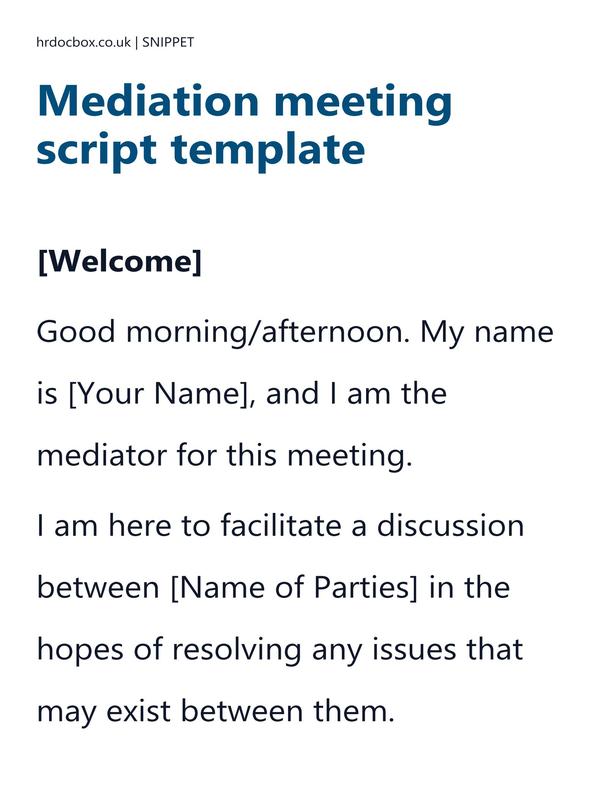Mediation meeting script template


Our Mediation Meeting Script template guides facilitators through structured conversations, promoting effective communication and resolution during mediations.
- Includes 12 months' access to the Mediation meeting script template, with all updates provided free of charge and notified to you.
- UK-specific accuracy.
- 441 words over 2 pages.
- Last updated 08/02/2025.
- Format: Word / plain text / email.
- Delivery: Instant download after purchase (no physical item).
- Access: Download link shown here after checkout.
- This Mediation meeting script template will SAVE you up to 1 hour 30 mins drafting & research, save you money, and reduce your risk.
1 [Welcome]
1.1 Good morning/afternoon. My name is [Your Name], and I am the mediator for this meeting.
1.2 I am here to facilitate a discussion between [Name of Parties] in the hopes of resolving any issues that may exist between them.
2 [Purpose]
2.1 Firstly, I would like to provide an overview of the mediation process. Mediation is a process in which parties come together to discuss their concerns and work towards a mutually acceptable solution.
2.2 The purpose of this meeting is to find a mutually acceptable solution that addresses the concerns of all parties involved. I would like to remind everyone that this is a confidential meeting, and anything discussed during this meeting will remain confidential.
As the mediator, I will not make any decisions on behalf of the parties, but rather will facilitate discussions and
This is a 30% preview of the Mediation meeting script template. For instant full access, purchase this item or a parent bundle.
Mediation meeting script template purpose
The purpose of this template is to provide a guided framework for conducting mediation meetings, facilitating constructive conversations between parties in conflict.
By offering predefined prompts and dialogue suggestions, it ensures a balanced and productive discussion aimed at resolving disputes.
This script template aims to foster a collaborative atmosphere and promote understanding, ultimately aiding in finding mutually agreeable solutions to conflicts.
Practical application of a Mediation meeting script template
- The Mediation meeting script template should be actioned / delivered during the meeting itself.
- It is sent / delivered by an employer / HR team to an employee.
Mediation meeting workflow
Mediation meeting workflow
Check which resources should be implemeted before and/or after the Mediation meeting script template, to understand the workflow.
Mediation meeting invitation letter
Our Mediation Meeting Invitation Letter Template facilitates conflict resolution by inviting parties to engage in a structured dialogue process.
Mediation meeting outcome letter
Our Outcome of Mediation Meeting Letter Template streamlines documenting mediation outcomes, preventing disputes, and ensuring clear understanding for both parties.
Practical example
Practical example
Instantly unlock with a purchase.
Instantly unlock with a purchase.
Scenario: Workplace Conflict between Team Members
At ABC Limited, a marketing department consisting of ten employees works closely together on various projects. Recently, tension has been brewing between two team members, John and Emily.
John, a seasoned marketer with a preference for traditional advertising methods, often clashes with Emily, a younger colleague who advocates for digital marketing strategies. Their conflicting approaches have led to disagreements during team meetings, with both parties feeling frustrated and unheard.
Despite attempts from their line manager to address the issue informally, the conflict persists, affecting team morale and productivity. Recognising the need for a structured intervention, HR Manager Sarah decides to initiate a mediation meeting between John and Emily.
Sarah schedules the mediation meeting to provide a neutral and confidential space for John and Emily to air their grievances and work towards a resolution. The mediation process aims to facilitate open communication, identify underlying issues, and explore mutually acceptable solutions.
During the mediation meeting, Sarah guides the discussion, allowing John and Emily to express their perspectives and concerns without interruption. She encourages active listening, empathy, and respectful communication throughout the dialogue.
With Sarah's facilitation, John and Emily acknowledge the impact of their communication styles on team dynamics and express a willingness to find common ground. Through constructive dialogue and brainstorming, they agree to implement a more collaborative approach to project planning and decision-making, incorporating both traditional and digital marketing strategies.
Sarah concludes the mediation meeting by documenting the agreed-upon action plan and scheduling a follow-up meeting to review progress. She emphasises the importance of ongoing communication and conflict resolution skills to maintain a positive work environment.
Frequently Asked Questions about a Mediation meeting script template
Frequently Asked Questions about a Mediation meeting script template
-
Can I use the Mediation meeting script template in my small business?
Yes. The Mediation meeting script template is designed to be flexible and suitable for organisations of all sizes, including small businesses and charities. It follows UK employment law best practice, so even if you don't have an in-house HR team, you can confidently apply it.
-
Is the Mediation meeting script template compliant with 2026 UK employment law?
Absolutely. Like the Mediation meeting script template, all of our templates are drafted with the latest ACAS guidance and UK employment legislation in mind. We review and update them regularly, so you can be confident they remain compliant.
-
Can I customise the Mediation meeting script template for my organisation?
Yes, we highlight the areas of the Mediation meeting script template that you need to update with your own details, and where you need to make decisions to suit your situation. This saves you time and ensures that you meet best practice.
-
Do I get instant access to the Mediation meeting script template?
Yes. Once purchased, you'll be able to download the Mediation meeting script template instantly. Templates are provided in editable Word or Excel format so you can customise them easily, and in PDF format for easy sharing.
-
What if I need more help, not just a Mediation meeting script template?
If you're looking for broader support, we also offer toolkits and library bundles that include the Mediation meeting script template, along with other HR templates and policies for fully managing your situation. These may be more cost-effective if you need deeper advice.
-
Why should I use this Mediation meeting script template, and not AI to generate it?
The risk of using a free AI-generated template 'without review' includes your legal exposure, missing context, and no awareness of the wider process, whereas purchasing the Mediation meeting script template from us mitigates that risk.
